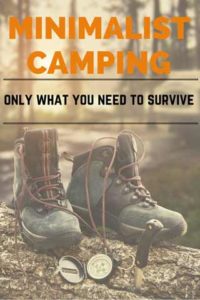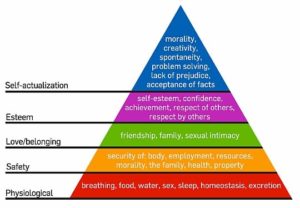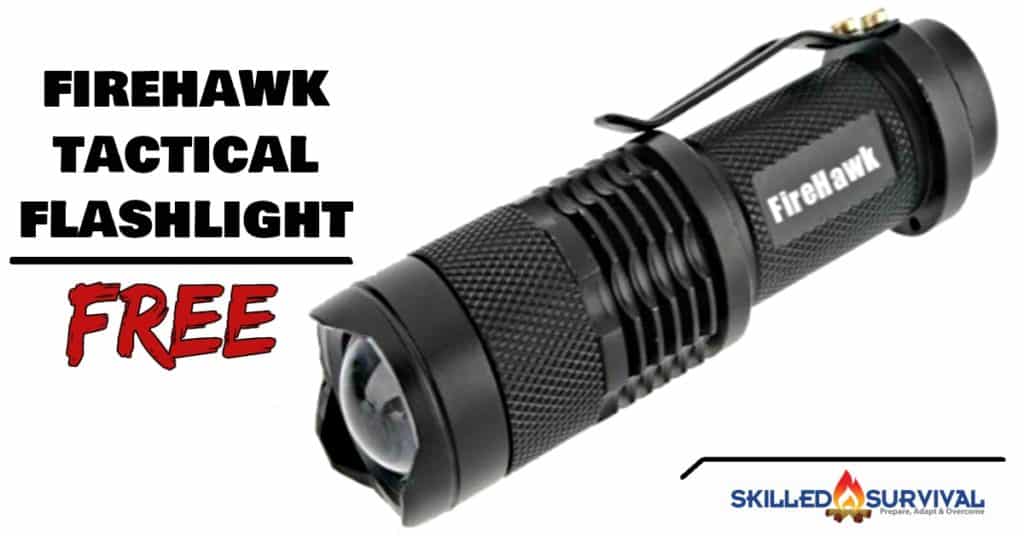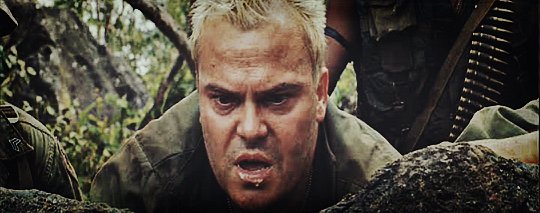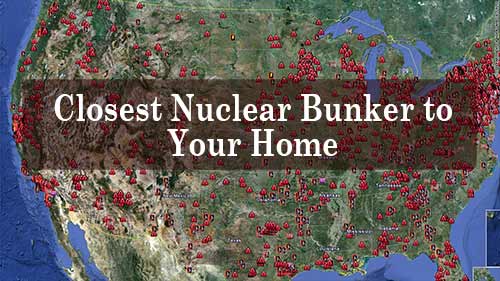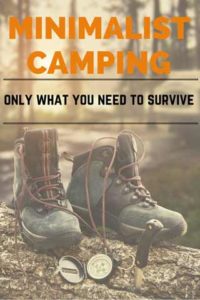
Minimalist camping is surviving.
It’s about testing yourself and battling nature with as little equipment as possible.
Can you grab your bag and make it three days with only its contents?
Yes, you can.
I will show you in this article exactly what you need and how to camp with a minimum amount of stuff.
What You Really Need for Camping & Backpacking
Minimalist Camping Should Be About Avoiding The Crowds
Comedians joke that camping is “spending a fortune to live like a homeless person for the weekend.”
They might have a point if we’re talking about RV camping or staying in a tent city (a.k.a busy campgrounds).
In these instances, you really are spending a small fortune living in a remote parking lot. But, if you do camping right, you won’t listen to your tent neighbor snoring all night.
You’ll be gazing at stars that can’t be seen from the city. You’ll be hearing the elk bugle and hanging your food to keep it from out of reach of brave bears.
In short, camping should trade the noisy headaches of your day-to-day life for the serenity of nature. And all its challenges.
Minimalist camping ironically takes even more planning and careful packing than car camping.
If you pack all your stuff on your back and hike out 4 miles, only to realize that you forgot your tent, you don’t just jog back to the car and grab it. Most likely, you get to work building a natural shelter!
Minimalist camping is about self-reliance. What you lack in gear, you make up for with skills.
So the first thing you need to ask yourself when you think about minimalist camping is, “What do I truly NEED?”
As A Way To Introduce You To Skilled Survival, We’re Giving Away Our #78 Item Complete Prepper Checklist. Click Here To Get Your FREE Copy Of It.
What Do You Absolutely Need To Survive In The Elements?
That is the main question at hand when you begin planning a minimalist camping trip. This is not just a conversation about backpacking but also about bugging out.
Remember that Maslow guy? Abraham Maslow was a pioneering psychologist who came up with Maslow’s hierarchy of needs.
Here’s a quick primer if you don’t remember him from a high school psych class.
You need the stuff below before you can get the stuff above. Without air, food, water, and shelter, you won’t worry about your feeling of safety because you’re worried about just surviving!
If those essentials are NOT taken care of, you can’t focus on love and belonging if you don’t feel safe. If you don’t feel loved, you can’t address your self-esteem. You can’t achieve your full potential (self-actualization) if you have no self-esteem.
The Bottom line: Your basic survival needs precede your happiness needs.
Ok, enough touchy-feely stuff already. Sorry, but we will NOT address your self-actualization or esteem here today.
However, we can help you get some inner satisfaction by knowing you’re ready for anything. Aside from that, we’ll leave your psychological health in the hands of you and your shrink.
Basic Survival Needs
The pyramid’s base is all the stuff that SkilledSurvival.com is all about, and this article will be no different.
When we discuss SHTF scenarios and begin preparing for them, we are essentially preparing to get the base of the pyramid items in place. No matter what.
Minimalist camping is really about learning how to address your base Maslow needs out in the beauty of nature.
So if you’re debating which electronic device to take with you, then you’re not discussing minimalist camping.
A way to communicate, just in case?
That’s reasonable. But if you plan on playing Angry Birds or blogging about your adventures, then you’re NOT talking about minimalist camping.
Instead, let’s imagine your truck is on fire up in the mountains on a hunting trip. You grab your get-home bag and have to traverse a week’s worth of backcountry before you find civilization.
This is the minimalist camping I’m talking about.
This type of minimalist camping will help you prepare for an SHTF scenario.
So What Do You Need? The Base.
The rule of threes applies here. You can survive three:
- Minutes without air.
- Hours without shelter in extreme conditions.
- Days without water.
- Weeks without food.
Air.
I’m not suggesting that you carry a gas mask on your minimalist camping trip, but you have one, right?
Water.
The average person can survive three days without water. That doesn’t take into account much strenuous activity, just living, bugging in, let’s say.
The rigorous activity of backcountry camping will not forgive three days without water.
Iodine pills are an easy way to make almost any water safe to drink.
Water filters are incredibly advanced these days. The LifeStraw, for example, boasts that it removes 99.9999% of bacteria. It’s smaller than a paper towel tube and weighs 2 ounces.
You also need a simple stainless steel water bottle to carry your water away from the water source.
Side Note: In SHTF world, be careful. The bad guys know that you need water. And they may be watching the water like crocodiles watch zebras.
Food.
Remember that everything will be on your back. Food should be light and easy to prepare.
MREs, trail mix, jerky. Survival pays no heed to the food pyramid. You need calories, vitamins, and minerals. Hell, you can live off Ramen noodles and multivitamins for quite a while.
I’m a big fan of dehydrated chili and split pea soup. A few full meals that weigh mere ounces on my back is a win. Here are the freeze-dried camping meals Skilled Survival highly recommends.
If you can handle the odor of patchouli, you can get these cheaply at your local co-op.
Skills to replenish your food supplies may not be important for your weekend of minimalist camping, but in preparation for SHTF, it is vital.
A spool of strong fishing line, a dozen hooks, and the capability to catch nightcrawlers adds nearly no weight to your pack. It can also provide you with a limitless food supply (in the right location).
If you plan on cooking, you’ll need a pot, too. I carry a portable stove and pot packed with my dehydrated soup and packed with the trash. Get a portable pot that also comes with a bowl and utensils.
As A Way To Introduce You To Skilled Survival, We’re Giving Away Our Ultimate Camping Essentials Checklist. Click Here To Get Your FREE Copy Of It.
Heat.
An entire article on its own, but the rule of threes tells no lies. If unprepared, you will die of heat loss in a cold environment.
There are five ways that your body loses heat, and you will prevent them if you’re prepared.
You ONLY Need These 5 Things to Survive
1. Radiation.
The heat your body produces will stay yours only if you trap it. You do this by wearing a coat or clothing appropriate for the season. Think of this selfishly. Keep your heat. You don’t leave the door open in your house so that you heat the neighborhood. So zip up your jacket.
One other item you can use to trap heat is a mylar blanket. They are cheap and very lightweight. A great piece of gear to add to your minimalist camping list.
2. Conduction.
Contact with colder items soaks up your body heat and continues until your temperature and that object’s temperature is the same.
You will lose if you sleep without a sleeping pad on cold hard ground. Your heat is minuscule compared with the earth’s cool. The earth is a heat sink, and while in contact, it will continue to steal all your heat all night long.
3. Evaporation.
Wet clothes will kill you in a cold environment. Don’t get wet! Bring rain gear. If you get wet, get a fire going and get your wet clothes off before hypothermia.
Get a good poncho with a hood. It weighs nearly nothing, takes up very little space, and will keep you dry.
4. Convection.
As air moves past you, it steals heat. You prevent this by wearing a windbreaker of sorts. The right raincoat can pull double duty here, keeping you dry and warm. Staying in your shelter prevents this, too.
5. Respiration.
The only way to totally prevent heat loss through respiration is to stop breathing. When you take cold air into your body, you warm it before it hits your lungs. Doing so gives off your heat to that cold air. However, wearing a neck gator will help to minimize this in cold weather.
Extra clothes.
Pack for the weather you expect and worse. Gloves, a stocking hat, pants, another shirt, and an extra pair of socks at a minimum. A cap to keep the sun off your moneymaker.
Waterproof matches, and a lighter, are kept in a waterproof container. This is a hybrid category that serves your shelter needs as well as your food needs. You need the capability to make fire!
We might make it without a stove or fire on our minimalist camping trip if everything goes right. No fire or stove is needed if it’s MREs and jerky for dinner.
You can be warm without a fire if you have a good sleeping bag and a small, lightweight tent.
A portable camp stove and a can of gas may be worth it to you. It certainly simplifies cooking and is great camping gear. But we’re discussing minimalist camping; I would argue you can accomplish the same thing with the weight of a Bick lighter and some effort.
While we’re at it, you should have at least three ways to make a fire. When you’re all out of 1) Bick lighters and 2) matches, will you still be able to make a fire?
Shelter.
A tent is the best plan, with a tarp to go below it so you don’t destroy the tent. You can find or build a shelter if you want to rough it.
Rock outcroppings or caves can protect you from the elements. You’ll be warm and dry if you build a fire at the mouth. That’s about as primitive as you can get with opposable thumbs!
Just remember, this is your playground. If every Tom, Dick, and Larry built a shelter on your land this weekend, that land would look like a pine-scented tent city.
The tent city you worked so hard to get away from.
A sleeping bag.
The more you pay, the more versatile you will be. You can get a very light sleeping bag that will keep you warm well into the winter months, but it will cost you dearly.
You can get by with an emergency blanket wrapped tight, but it won’t be your most comfortable night.
A sleeping pad sounds like a luxury but is actually a survival need with the added perk of providing you some comfort. It helps you avoid that warmth-sucking conduction we talked about earlier.
If you don’t have a sleeping pad, you can create a simple buffer between the earth and the earth with leaves and debris. Make a bed of leaves (the more, the better) and create a natural sleeping pad.
This is not for comfort (even though it might be more comfortable than the “cold, hard ground”). It’s about keeping the earth from stealing all your precious heat.
That brings me to an important point and goes back to my previous article about sleep. If you can’t sleep well, you’re worth very little and will not enjoy your camping trip.
The tent, sleeping pad, and sleeping bag will make up a lot of your pack weight. But skimming on these items will make your trip miserable and possibly even dangerous in cold weather.
This is minimalist camping, so portable camping toilets are out.
Instead, pack some toilet paper and a survival shovel.
I won’t go into many details here, but we’ve all probably encountered the lazy shitter. You know, the one that left his turds and TP along the side of the trail for God and everybody.
Don’t be that guy.
Take the time to dig a small cat hole. And if you’re primitive enough to use a smooth rock or some foliage for TP, bravo. You’re a better man than me.
Rain gear.
This goes along with shelter. If you get wet and can’t get dry, you’re on a dangerous ride toward hypothermia. A raincoat is one of those contingent items that you may never need, but to need and be without could prove miserable. Possibly even deadly.
A small medical kit.
At the very least, you need something that can act as a tourniquet. No need to go crazy and buy a thirty-dollar piece of equipment. If you know what you’re doing, a bandana and a pen will do the job. There are a thousand uses for a bandana beyond a tourniquet.
Bandaids. Neosporin. Moleskin.
Set yourself up to save your life with a tourniquet and take care of little wounds that could become nasty infections.
Hygiene.
Can you stand your own stink? I can’t tolerate my own unbrushed teeth, so I always have a toothbrush and toothpaste. Maybe your B.O. is offensive to you.
Bring deodorant.
I can live with a river bath, but you might want to bring some moist towelettes. Soap or hand sanitizer. Remember your cathole? Now is not the time to pick up Hepatitis C or some other fecal-borne disease.
A multi-tool.
Get one with at least pliers and a sharp blade. You will almost definitely need a good survival knife at some point. But if every ounce matters, you could get away with a credit card knife for a short trip.
Or you could compromise between the two with a survival neck knife.
A headlamp.
Much lighter than a lantern and only lights what you need to see. Plus, it keeps both hands free to perform all those minimalist campsite chores.
Or you can pick up one of Skilled Survival’s FireHawk LED Tactical Flashlights.
For A Limited Time Only: Get a FREE FireHawk Tactical Flashlight For Visiting Skilled Survival! Just pay s&h. Click Here To Learn More.
A pocket notebook and pen.
This is one of those items I bring to record some of the best moments in life. I can read it later and remind myself why I purposely bug out from society.
It’s also a great place to write things like, “I really wish I would have brought playing cards or a survival book.”
Survival Playing Cards.
At only about 3 oz, a deck of survival cards can keep you highly entertained without weighing you down.
Duct tape.
I’m sure I’d be preaching to the choir if I started talking about how useful duct tape is for survival, so keep some handy. I have a half-roll wrapped around a pen to keep it compact and ready for use.
Here are 20 survival uses for duct tape provided by our fellow survivalists over at UrbanSurvivalSite.com
Paracord.
It’s another lightweight item with limitless uses. Paracord, a tarp, and a couple of trees make for an easy survival shelter.
A survival hatchet.
Very handy for collecting wood, building a shelter, or any number of things.
So that is the most basic level of equipment you’ll need with a few contingency items. Of course, you’ll have to adjust it to your trip and to your environment. For instance, if you plan on doing some real backcountry fishing, bring the damn poles!
A firearm.
The weight of a loaded pistol is nothing to sneeze at. My Glock 21 is 2.25 pounds of added weight on my camping trip. But you have to watch out for bears and hillbillies where I camp.
When you don’t see one, it’s probably because the other is near. This comes back to the question, “what do you NEED?”
I NEED the peace of mind that I get from being ready to address a threat. For me, happiness IS a warm survival gun.
We all have things we cannot do without.
I once cut a great camping trip short once because I didn’t bring coffee. I thought I could make it without the sweet nectar, but I was wrong.
Picture Jack Black in “Tropic Thunder,” wild-eyed and desperate.
By 11:00 AM, instead of fishing with my son, I was shamefaced in a roadside diner and pouring Folgers into my veins.
Guess who carries a dozen Starbucks Via packs in his bug out bag? The point is if you need cigarettes or can’t sleep without a Benadryl, make it happen. It is what it is; plan for it.
Notice any similarity between the list created for minimalist camping and Skilled Survival’s bug out bag checklist?
As A Way To Introduce You To Skilled Survival, We’re Giving Away Our Ultimate Camping Essentials Checklist. Click Here To Get Your FREE Copy Of It.
That’s what minimalist camping is all about. Can you grab your bag and make it three days with only its contents?
Embrace the suck.
Test yourself. We’re all prepping for a scenario that may not happen. But buying a bunch of equipment that sits on your bunker shelf is not where life is lived.
Go out.
Test yourself. Survive for a three-day weekend with nothing but the contents of your bug out bag. Take notes. Learn some new camping hacks to make things better.
Look at your gear and see what gets dirty and what gets used. What can you leave at home next time? What did you really need that was missing? Let us know what you find essential.
Disclaimer.
There are way too many stories about survivalists testing themselves and being found dead. Don’t go overboard.
Don’t hike the desert; planning on finding water with a forked stick. Do not put an emergency blanket in your pocket and head out into the snowy Rocky Mountains.
Be smart.
Be prepared. Survive your trip and always have a backup plan and an escape route, just in case. Let people know when you leave and when you should be back.
There’s no shame in calling it quits if things go south.
Cody Mo
P.s. Do you know where the closest nuclear bunker is from your home?
There are a lot of natural nuclear shelters in the US that are absolutely free. And one of them is near your home.
Click here to see the Closest Natural Nuclear Bunker to Your Home?
Click on the image above to find out where you need to take shelter.
Photo Credit: Tent Setup
The post Minimalist Camping: Taking Only What You Need To Survive appeared first on Skilled Survival.


